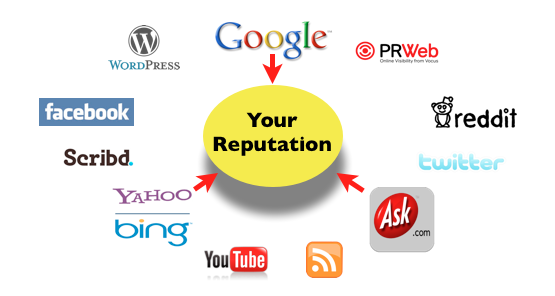10 Ways You Could Be Unknowingly Damaging Your Online Reputation
Can you imagine a cigarette-maker not only openly acknowledging that their product is deadly, but also publishing a scientific study that shows the deaths provide economic benefit to the nation in which the decedents lived? When the Czech Republic decided to raise awareness about how much money the country was spending on health care for smokers, that’s exactly how Philip Morris responded.
No kidding! The tobacco giant tabulated costs associated with things like caring for people who became ill as a result of smoking or of secondhand smoke, and then determined cigarette-related deaths were saving the country almost $150 million.
Talk about a face-palm moment. It’s unfathomable that Philip Morris reps could possibly think the report was a good idea. This is a massive company with a billion-dollar marketing budget and an imaginably large legal fund. They can afford to hire the best of the best, and yet their reps still made this huge snafu.
It’s tough to imagine a small-business owner launching such an epic PR fail, but even a seemingly trivial reputation problem can break a startup. Take a look at these ten things small-business owners do that damages their reputation, and make sure you’re not inadvertently harming your online reputation, too.
1. Failing to Respond to Positive Comments on Social Media
It takes some serious effort to build up a social media community, and your fans are its lifeblood. After all the effort you’ve spent growing it, do you really want your followers to hear crickets when they talk to you? Of course not. When you receive kudos, it’s a perfect time to build a relationship with that consumer, and your response (or absence of) is duly noted by everyone who comes across the post later. Respond to the positive comments, so people know they’re talking to a real human who cares and is grateful for their business.
2. Failing to Respond to Negative Comments Anywhere
This one is kind of a no-brainer, but you must address a negative comment or complaint. There was a time when people would call customer service, but now they turn to social media. Sometimes the individual wants their problem resolved, though other times he may just want to vent, warn off others, or may have an entirely different reason for commenting. A thoughtful response to these comments is basic customer service, and it shows your audience that you take care of your customers. For maximum impact, run an automated service that tells you when your company’s name is mentioned online, so you can address concerns wherever they may be. Search Google for a keyword monitoring tool that can keep an eye on the net for new mentions of your name, or use Google’s free services like alerts or “Me on the Web” to be notified when your personal info appears somewhere.
3. Deleting Negative Comments
It’s tempting to make a problem child disappear on sites like Facebook, where you have control over content. Unfortunately, this usually just makes the person begin to comment on sites where you have no control, like Yelp, or with the BBB. Then, they can tell the world that you’ve deleted their complaint, and it makes your company look dishonest and uncaring. It’s especially damaging, because people go to these sites specifically to verify your reputation, and negative comments left can impact your business forever. Address the issue, no matter how difficult it is.
4. Misleading Consumers with Links
Whether you’re using traditional links or clickable ads and images, take care to ensure that the clicker will land where he / she expects to.
5. Cloaking or Using Doorway Pages on Your Website
In an effort to have a flawlessly search engine optimized page, some small-business owners turn to black hat, or deceitful methods. Cloaking might be used to show a search engine content that will rank the page better, while giving human readers something else. Doorway pages work similarly, and give search engines content they’ll like, but quickly divert human clickers to another page or site. While the search engine may index your perfect content, people click on the links expecting one thing and then find another.
Your content is deemed useless, your website is considered irrelevant, and the potential customer bails. Then, Google catches on to what you’ve done and drops you to the end of their list, just like they did with the renowned automaker, BMW.
6. Using Someone Else’s Content
It’s so easy to copy and paste online, but it’s still a big no-no. It’s illegal when done without permission, Google will can you for it, and it doesn’t sit well with consumers. Write your own material, or have it professionally created. Your audience will be better engaged because it’s unique anyway.
7. Allowing Ads From, or Partnering with, Hot-Button and Debatable Sources
While most small-businesses don’t display third-party ads on their websites, some choose to do it for extra income, or their webmasters automatically integrate things like Google AdSense for them. If you happen to serve ads, politics and religion should be a no-go on your site, unless you run a religious or political website. People are highly-opinionated regarding certain subjects, and if your site displays ads for their associated companies or partner with a related industry, there’s a chance it will hurt you in the long run. In addition to politics and religion, steer clear of companies related to:
- The adult industry
- Gambling
- Alcohol
- Drugs
Other categories that might cause conflict (pay attention to the ads you serve)
8. Failing to Monitor the Internet for Mentions of Your Company
Although this was mentioned in number-two, it deserves a spot of its own on this list. Use a service to monitor the net, so you’ll always know when people are talking about you. It makes sense from a customer service standpoint, but it can also give you ideas as to where your target audience lurks, just in case you aren’t already there. Again, some people are perfectly happy with Google’s free services, but it’s easy to find other companies that provide keyword monitoring or alerts.
9. Giving a Personal Opinion
Remember a few years ago when the CEO of Abercrombie & Fitch was quoted as saying, “A lot of people don’t belong [in our clothes], and they can’t belong?” He explained that the store’s clothes were designed for the “cool kids” and, subsequently, they did not offer plus-sized women’s clothes. At the time these comments went public, the company’s stock price was at about $54, but the story went viral, and within three months, the value was just $35. Although the company recanted, and apologized for the CEO’s words, stock price plummeted to about $16 within 24 months of the scandal. If you can afford to have a controversial opinion, by all means speak your mind. Otherwise, learn from A&F’s mistake. Do not give a personal opinion on anything.
10. Forgetting to Encourage Happy Customers to Write Reviews
Positive comments speak volumes about your company, and people rely on these reviews when they’re deciding whether to use your services or not. Be wary of incentivizing people in order to get reviews though, because some services track it and will call you on it. It’s usually a violation of the review site’s terms and conditions, which means they can remove, blacklist, or even sue you. However, your happiest customers want to see your business succeed, and they’re likely to leave glowing remarks if you shoot them an email or ask them to review you.
While it’s not every day that we see PR debacles on scale with the Philip Morris and Abercrombie & Fitch ones, the everyday common mistakes are hurtful to your online reputation, too. Although it’s ok to target a specific kind of customer, it’s business suicide to exclude anyone- regardless of whether it’s done verbally or with your silence. Keep a close pulse on your brand’s community, and do your best to keep thinks flowing positively. The more you work on the little details, the better your small business’ online reputation will be.







Leave A Comment